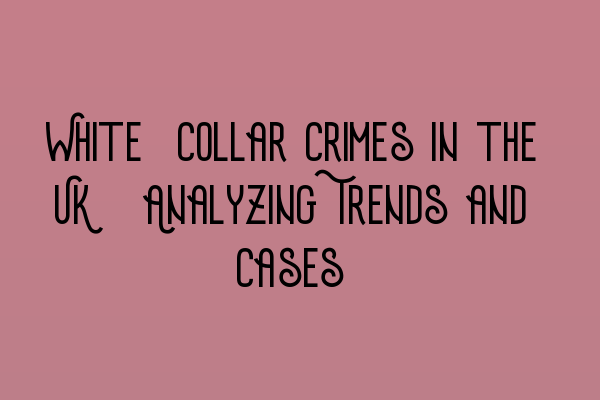White-Collar Crimes in the UK: Analyzing Trends and Cases
In recent years, the occurrence of white-collar crimes in the United Kingdom has become a pressing issue. These crimes, typically carried out by individuals in the professional and business sectors, involve non-violent offenses that are financially motivated. As a solicitor at SQE Criminal Law & Practice Law UK, I have been closely examining the trends and cases related to white-collar crimes. In this blog post, we will delve into the world of white-collar crimes, exploring their increasing prevalence and the implications for both individuals and society as a whole.
The Rising Tide of White-Collar Crimes
White-collar crimes encompass a broad spectrum of illegal activities, including fraud, embezzlement, insider trading, money laundering, tax evasion, and bribery. Over the past decade, these crimes have been on the rise in the UK, posing significant challenges for law enforcement agencies and legal practitioners.
One key trend that we have observed is the increasing sophistication of white-collar criminals. With advancements in technology, perpetrators now have access to sophisticated means of carrying out their illicit activities, making it harder for authorities to detect and prevent such crimes. Cybercrime, in particular, has seen a substantial surge, with hackers targeting not only individuals but also businesses and government institutions.
Another contributing factor to the growing incidence of white-collar crimes is the inherent nature of these offenses. White-collar crimes are often complex and require extensive knowledge and expertise in areas such as finance, accounting, and law. This means that those in positions of power and authority are more likely to engage in such offenses due to their understanding of the intricacies involved.
Notable Cases and their Impact
Several high-profile white-collar crime cases in the UK have shed light on the magnitude of this issue. One notable case is that of the “HBOS Reading scandal.” This case involved senior managers at HBOS who conspired with external consultants to force small businesses into financial distress, allowing the perpetrators to profit from their downfall. The scandal resulted in significant financial losses for the victims and highlighted the need for stricter regulation and oversight in the banking and financial sectors.
Another prominent case is that of the “Patisserie Valerie fraud.” In this instance, the company’s finance director manipulated the company’s accounts, leading to a huge overstatement of its assets and profitability. This deception ultimately resulted in the collapse of the company and highlighted the importance of robust internal controls and corporate governance measures.
Impact on Individuals and Society
The impact of white-collar crimes extends far beyond the immediate victims. These crimes erode public trust in businesses, financial institutions, and the legal system as a whole. They undermine the integrity of the economy and can have far-reaching consequences for individuals and society at large.
Individuals who fall victim to white-collar crimes often experience devastating financial losses. Many lose their life savings, retirement funds, or are left with crippling debts they are unable to repay. The psychological toll of such crimes can also be immense, leading to anxiety, depression, and a loss of faith in the fairness and transparency of the financial system.
On a broader scale, white-collar crimes have adverse effects on the economy. They distort market competition, drive up costs for consumers, and hinder economic growth. These crimes divert resources away from productive endeavors, channeling them instead into illicit activities. Additionally, they contribute to the perpetuation of economic inequality, as the financial burden often falls disproportionately on the less privileged.
Combating White-Collar Crimes: The Way Forward
Efforts to combat white-collar crimes require collaboration among law enforcement agencies, legal practitioners, and regulatory bodies. Robust legislation and effective enforcement mechanisms must be in place to deter potential offenders and ensure that those who do engage in such crimes are held accountable.
Enhancing private-public partnerships and information sharing is vital in the fight against white-collar crimes. Utilizing technological advancements can aid in preventing and detecting these offenses, allowing for more effective prosecution. Training and specialization in the field of white-collar crimes should also be emphasized to equip legal professionals with the necessary expertise to handle such complex cases.
At SQE Criminal Law & Practice Law UK, we offer comprehensive SQE 1 practice exam questions and SQE 1 practice mocks FLK1 FLK2 to help aspiring solicitors develop the knowledge and skills needed to tackle white-collar crimes effectively. Our SQE 2 preparation courses are designed to provide practical insights into the complexities of criminal law and practice.
Stay up to date on SRA SQE exam dates to ensure you don’t miss any important deadlines in your journey towards becoming a qualified solicitor specializing in criminal law.
White-collar crimes continue to pose challenges for the UK legal system. By staying vigilant and continuously adapting to the evolving nature of these offenses, we can strive towards a society that is free from the detrimental effects of financial malfeasance.
